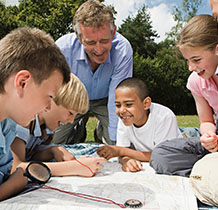Resource Database

Click on a topic or use the search box below to look for a listing:
There are 488 resources. Displaying 10 resources per page.
In this Afterschool Alliance webinar recording, "Foundations for Young Adult Success: A Developmental Framework," researchers from University of Chicago Consortium on Chicago School Research discuss the findings of their newly released report, which provides evidence from child/youth development, cognitive science, psychology, and learning theory. Educators, out-of-school time practitioners, policymakers, and funders can use these findings to ground their work in a firm understanding of important goals for human development.
View Resource
Despite the recent attention this topic has received, efforts to define and measure social and emotional competencies in afterschool settings are still emerging. This brief from Beyond the Bell, an expanded learning initiative from American Institutes for Research, provides an overview of social-emotional learning (SEL) in the classroom and afterschool. It also discusses the latest research and outlines strategies for fostering SEL in afterschool programs.
View Resource
How can afterschool systems best leverage data to build, grow, and sustain their efforts? Hosted by the American Youth Policy Forum and Afterschool Alliance, this webinar recording includes a discussion among afterschool system leaders on how they are using program data to support the growth and development of their systems.
View Resource
Sustainability
Published by America’s Promise Alliance, Expanded Learning: Expanded Opportunity profiles four communities using out-of-school time to boost equity, academics for students in low-income neighborhoods, and low-performing schools. The report highlights the importance and challenges of topics like community collaboration, accurately assessing progress, student voice, and non-academic, or “soft,” skills.
View Resource
Program Management
Working in an afterschool program involves taking on many roles and interacting with a variety of people, including staff, parents, and children. This article from the National AfterSchool Association outlines effective communication techniques that afterschool practitioners can use to help maintain a clear vision of the program's goals, clarify expectations of staff and students, and assure parents that their children are in good hands.
View Resource
Program Management
The beginning of the school year provides an opportunity to meet new school-day staff and renew relationships. This blog post from the Center for the Collaborative Classroom offers ideas and strategies for coordinating with school leaders so you can make the most of your afterschool program.
View Resource
Program Management
In 2003, The Wallace Foundation began an initiative to help five cities develop afterschool systems, a coordination of efforts and resources among government agencies, private funders, and afterschool programs. Growing Together, Learning Together, a Wallace Perspective report, focuses on the four components of afterschool system building that the most current evidence and experience suggest are essential: strong leadership from major players, coordination that fits local context, effective use of data, and a comprehensive approach to quality.
View Resource
Program Management
Good attendance is key to student success, and afterschool programs can play a critical role in partnering with schools to support and reinforce good attendance habits. To help educators promote good attendance year round, Attendance Works is hosting its annual September is Attendance Awareness Month. The Attendance Works website has planning tools and promotional materials available for schools and other organizations to use.
View Resource
Program Management
This research brief from the RAND Corporation describes the near-term effects of voluntary summer learning programs provided by five urban school districts to large numbers of struggling low-income elementary students in Summer 2013. Early results of the assessment show that students who attended the 5-week programs entered school in the fall with stronger mathematics skills than those who did not. Additionally, five factors had a statistically significant association with mathematics or reading outcomes: consistent attendance, more hours of instruction, teachers with grade-level experience, orderliness of summer sites, and instructional quality.
View Resource
Academic Enrichment
Community schools, collaborations between the school and other community resources and organizations, create a wide range of supports for children, youth, families, and community members-an approach to education that many districts and cities are adopting. This resource guide from ExpandED Schools examines the role of expanded learning in the New York City Community Schools Initiative and outlines promising practices in the initiative. It also offers recommendations to ensure that the broad network of Community Schools get the most out of their expanded learning efforts.
View Resource
There are 488 resources. Displaying 10 items per page.
- Academic Enrichment
- Afterschool Enrichment
- Classroom Management
- College and Career Readiness
- Diverse Learners
- Family and Community Engagement
- Program Management
- Social-Emotional Learning
- Sustainability
- Technology
Subscribe to the Illinois Quality Afterschool newsletter and resource bulletin.
